|
Water Heaters
Water Heaters
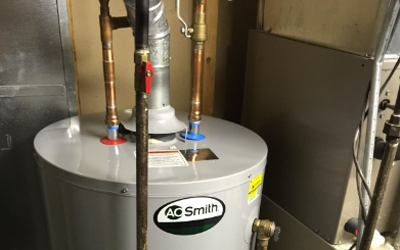 Water Heaters
Water Heaters
Hot running water is one of the great conveniences of the modern household. From showering and bathing to cleaning dishes and doing laundry,
water heaters give us the ability to take care of a slew of daily tasks with the utmost comfort. It is easy to take these unobtrusive
appliances for granted. After all, water heaters are built for functionality and durability, so chances are that once you have purchased
one you will have little interaction with it afterwards apart for making minor adjustments in temperature and settings. That is until the
day your heater starts malfunctioning or stops working altogether, which is when you realize just how important it is to have hot water on
demand at all times.
The first thing to note is that there are a wide variety of water heating options available depending on your specific requirements.
When selecting a new water heater for your home, choose a water heating system that provides enough hot water for your family and
is also energy efficient to save you money. Consider the different types of water heaters available and determining the right size
and fuel source for your home.
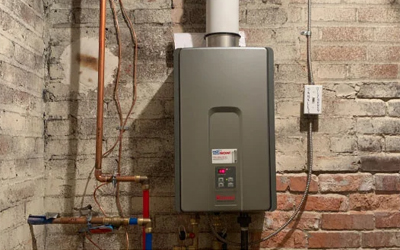 A-Terry's Plumbing is equipped and ready to address your water heater issue. The water heater
is essential to the household and our dependable and experienced crew will get the job done right and on time so that your family can get back
to a normal household. A-Terry's Plumbing is equipped and ready to address your water heater issue. The water heater
is essential to the household and our dependable and experienced crew will get the job done right and on time so that your family can get back
to a normal household.
Some of the Water Heater installation and repair services include:
- Water Heater Installation and Repair
- Water Heater Leak Repair
- Temperature and Pressure (T & P) Valve Installation
- Gas Shut-Off Valve Installation and Repair
- Gas Line Installation and Repair
- Water Shut-Off Valve Installation and Repair
- Water Heater Element Installation and Repair
- Water Heater Drain Pan Installation and Repair
- Flue Pipe Installation and Repair
|
Type of Water Heaters
| |
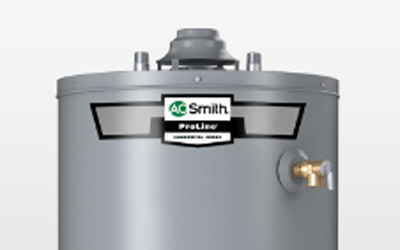 Type of Water Heaters
Type of Water Heaters
There are a wide variety of water heating options available in today's market, but the two most prevalent in this area are:
- Conventional Water Heaters - Offer a ready reservoir (storage tank) of hot water which is
adequate for everyday use. However, there are some instances, such as when more than one use for hot water is occurring or
when there are guests in the home, increasing the requirements for hot water.
- Tankless Water Heaters - Heat water directly without the use of a storage tank.
This type of water heater is designed to provide an adequate supply of hot water without running out when adequately sized.
|
| |
|
|
Selection Criteria
| |
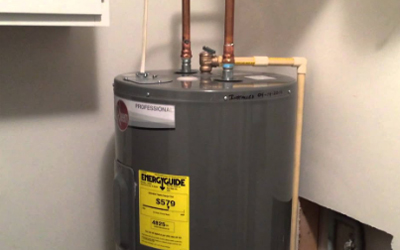 Selection Criteria
Selection Criteria
When selecting a replacement water heater for your home, consider the following:
- Fuel Type, Availability & Cost - The fuel type or energy source you use for water heating will not
only affect the water heater's annual operation costs but also its size and energy efficiency. See below for more on selecting
fuel types.
- Size - To provide your household with adequate hot water and maximize efficiency, you need a
properly sized water heater. Visit the pages on different types of water heaters (linked above) for more on sizing.
- Energy Efficiency - To maximize energy and cost savings, check the energy efficiency of a water
heater before you purchase it. Visit the pages on different types of water heaters (linked above) for more on estimating energy
efficiency.
- Costs - Before you purchase a water heater, it is a good idea to estimate the annual operating costs
and compare those costs with other less or more energy-efficient models.
|
| |
|
|
Fuel Type
| |
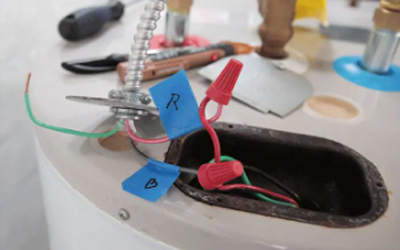 Fuel Type
Fuel Type
When selecting a new water heater, it's important to consider what fuel type or energy source you will use, including its availability
and cost. The fuel used by a water heating system will not only affect annual operation costs but also the water heater's size and
energy efficiency. Fuel type and its availability in your area may narrow your water heater choices. The following is a list of water
heater options by fuel in this area:
- Electricity - Widely available in the United States for conventional storage, tankless or demand-type,
and heat pump water heaters. It also can be used with combination water and space heating systems, which include tankless coil
and indirect water heaters.
- Natural Gas - Available in many areas of the United States to fuel conventional storage and demand
(tankless or instantaneous) water heaters, as well as combination water and space heating systems, which include tankless coil
and indirect water heaters.
- Propane - Available in many areas of the United States to fuel conventional storage and demand
(tankless or instantaneous) water heaters, as well as indirect combination water and space heating systems.
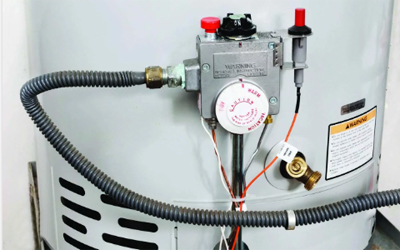 If
you have more than one fuel type available in your area, it is a good idea to compare fuel costs, especially if you are building
a new home. Even if you are replacing a water heater, you may find that you will save more money in the long run if you use a
different fuel or energy source. If
you have more than one fuel type available in your area, it is a good idea to compare fuel costs, especially if you are building
a new home. Even if you are replacing a water heater, you may find that you will save more money in the long run if you use a
different fuel or energy source.
However, if you are converting from one fuel type to another, there are other cost considerations, such as adding a breaker or running
a gas line to the water heater and venting it outside. Contact your utility for current fuel costs or rates.
The type of water heater you choose will also affect your water heating costs. One type of water heater may use a fuel type more
efficiently than another type of water heater.
|
| |
|
|
Conventional Water Heaters
| |
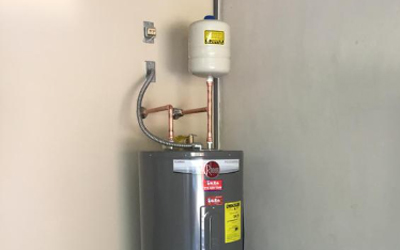 Conventional Water Heaters
Conventional Water Heaters
Conventional storage water heaters remain the most popular type of water heating system for the home. A single-family storage water
heater offers a ready reservoir (20 to 80 gallons) of hot water. It operates by releasing hot water from the top of the tank when you
turn on the hot water tap. To replace that hot water, cold water enters the bottom of the tank through the dip tube where it is heated,
ensuring that the tank is always full.
Since
water is heated in the tank until the set-point temperature is reached, energy can be wasted even when a hot water
tap is not running due to standby heat losses, which result from the tank losing heat to the surrounding environment. Only tankless water
heaters avoid standby heat losses. Some storage water heater models have
a heavily insulated tank, which significantly reduce
standby heat losses and lower
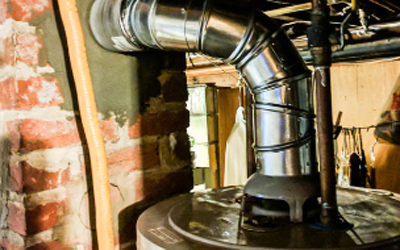 annual
operating costs. Look for models with tanks that have a thermal resistance (R-Value) of R-24 and above to avoid adding an insulation
blanket (electric water heaters only). annual
operating costs. Look for models with tanks that have a thermal resistance (R-Value) of R-24 and above to avoid adding an insulation
blanket (electric water heaters only).
The lowest-priced storage water heater may be the most expensive to operate and maintain over its lifetime. While an oversized
unit may be alluring, it carries a higher purchase price and increased energy costs due to higher standby energy losses.
Before buying a new conventional storage water heater, consider the following:
- Size and First Hour Rating
- Fuel Type and Availability
- Energy Efficiency and Costs.
|
| |
|
|
Tankless Water Heaters
| |
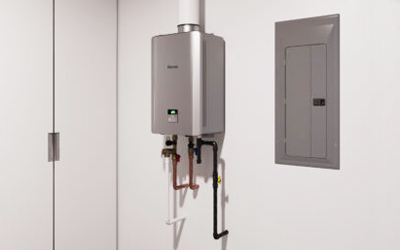 Tankless Water Heaters
Tankless Water Heaters
Tankless water heaters, also known as demand-type or instantaneous water heaters, provide hot water only as it is needed. They
do not produce the standby energy losses associated with storage water heaters, which can save money.
Tankless water heaters heat water instantaneously without the use of a storage tank. When a hot water faucet is turned on,
cold water flows through a heat exchanger in the unit, and either a natural gas burner or an electric element heats the water.
As a result, tankless water heaters deliver a constant supply of hot water. You do not need to wait for a storage tank to fill
up with enough hot water. However, a tankless water heater's output limits the flow rate.
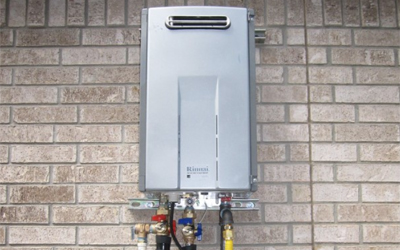 Typically,
tankless water heaters provide hot water at a rate of 2–5 gallons per minute. Gas-fired tankless water heaters produce higher flow
rates than electric ones. Sometimes, however even the largest, gas-fired model cannot supply enough hot water for simultaneous,
multiple uses in large households. For example, taking a shower and running the washing machine or dishwasher at the same time
can stretch a tankless water heater to its limit. Typically,
tankless water heaters provide hot water at a rate of 2–5 gallons per minute. Gas-fired tankless water heaters produce higher flow
rates than electric ones. Sometimes, however even the largest, gas-fired model cannot supply enough hot water for simultaneous,
multiple uses in large households. For example, taking a shower and running the washing machine or dishwasher at the same time
can stretch a tankless water heater to its limit.
For homes that use 41 gallons or less of hot water daily, demand water heaters can be 24%–34% more energy efficient than conventional
storage tank water heaters. They can be 8%–14% more energy efficient for homes that use a lot of hot water (around 86 gallons per
day). In some cases you may be able to achieve even greater energy savings if you install a demand water heater at each hot water outlet.
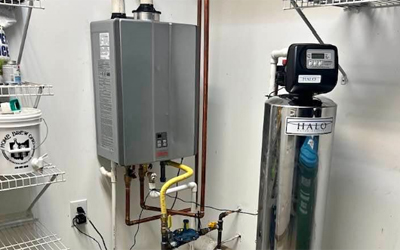 The
initial cost of a tankless water heater is greater than that of a conventional storage water heater, but tankless water
heaters will typically last longer and have lower operating and energy costs, which could offset their higher purchase price.
Most tankless water heaters have a life expectancy of 10-15 years. They also have easily replaceable parts that may
extend their life by many more years. In contrast, storage water heaters last 5–10 years. The
initial cost of a tankless water heater is greater than that of a conventional storage water heater, but tankless water
heaters will typically last longer and have lower operating and energy costs, which could offset their higher purchase price.
Most tankless water heaters have a life expectancy of 10-15 years. They also have easily replaceable parts that may
extend their life by many more years. In contrast, storage water heaters last 5–10 years.
Tankless water heaters avoid the standby heat losses associated with storage water heaters. However, although gas-fired
tankless water heaters tend to have higher flow rates than electric ones, they can waste energy if they have a pilot light.
This can sometimes offset the elimination of standby energy losses when compared to a storage water heater. In a gas-fired
storage water heater, the pilot light heats the water in the tank so the energy is not wasted.
We offer the Rinnai tankless water heater which is the number 1 brand in the US market of tankless water heaters. Rinnai
offers up to a 40% energy savings by only heating water on demand.
Before buying a new tankless water heater, consider the following:
- Size
- Fuel Type and Availability
- Energy Efficiency and Costs.
|
|
Page Buttons
Company Information
|
Copyright © 2004- |
|
|
|
All Rights Reserved |
|
|
|

